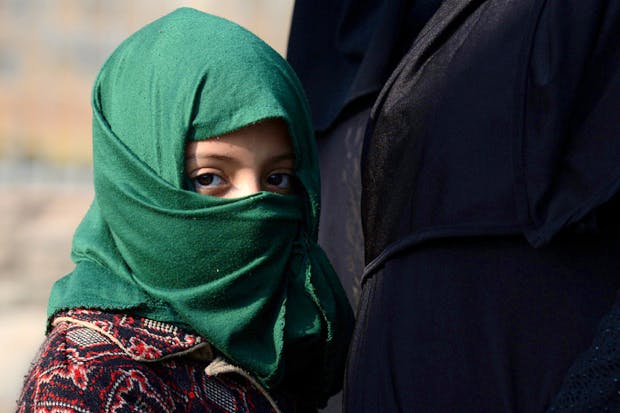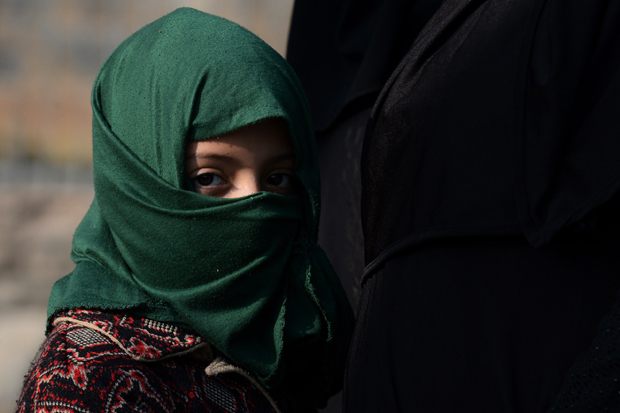How could they? How could girls brought up in the wealthy West abandon their families and their own bright futures to join Isis, a gang of vicious thugs? It’s not just our girls, either, they’re sneaking off to Syria from across Europe and America too, teenagers, bright ones typically, set on becoming sex slaves in a war zone.
London’s latest runaways — Shamima, Amira, Kadiza — were pupils at Bethnal Green Academy and the headmaster there, a Mr Keary, echoed most people’s reaction when he shook his head and said: ‘I don’t understand it. It doesn’t make sense.’
But Mr Keary’s wrong, most people are wrong. It does make sense. Let your outrage subside and it’s pitifully easy to see what draws these idiots to Islamism. It’s not evil, or any inherent flaw, but just a simple set of ordinary influences which combine to create catastrophe.
For a child to choose religious orthodoxy may seem sinister — aren’t teens supposed to want freedom? — but look again and it’s just the usual rebellion against a parent. These girls and others like them are usually second or third-generation Brits. Their parents have assimilated, hoped their children would follow suit, so they rebel by becoming Islamists. The Dutch academic Ian Buruma spotted the trend a decade ago in a book investigating the assassination (by an Islamist) of the film-maker Theo van Gogh. He said: ‘The main perpetrators of violence in the name of religion in Europe are not, on the whole, the original guest workers or refugees… it is their children born in Europe who are vulnerable to a modern, violent, revolutionary creed.’
Buruma was writing about angry young men, but in their own way girls are even more vulnerable to the siren call of a creed. Most normal 15-year-old girls are popping with righteous indignation, desperately seeking a cause. British schoolgirls of a secular sort find their vocation defending seal pups and abandoned dogs. But for a Muslim schoolgirl, already Islamo-curious, there’s a cause waiting in the wings — and it’s a cause that understands their language.
Isis may seem like bullies to us, but in the skewed light of a smartphone they appear as underdogs, a revolutionary brave brigade taking on the big bad West. Teens don’t sit and watch the news at ten, they pick it up piecemeal on social media. All three of the recent runaways followed countless jihadis online. On Twitter and Instagram, in their own carefully curated feeds, these no-hoper Isis yobs seem not only justified but cool, almost boyband. One Direction — east.
Yes, you say, but this boyband isn’t offering a snog or a celebrity selfie, but a life of rape and sharia law. What’s sexy about that? These girls have learnt about feminism, they must be deranged to volunteer for servitude. That’s a reasonable position, of course, but what hope does reason have against a teenage crush? Think of the screamers at pop concerts. Muslim girls are falling for Twitter profile pics of fighters in the same unstoppable way. There’s a sort of moth-like self-immolation about a teenage girl’s love which makes it almost long for martyrdom.
If you doubt that Islamists exert a Beiber-ish pull, look at the social media sites of Dutch jihadi ‘Yilmaz’. To anyone not crazed by puberty, Yilmaz is an obvious pillock. He spends his time taking moody selfies, and posting pictures of kittens. Yilmaz has had more than 10,000 marriage requests from lovestruck Muslim girls around the world.
The runaway girls also travel in packs, usually three at a time, and girls together form an echo chamber. Where one girl might see sense, three start seeing pixies. A girl group can turn any fantasy into reality in a few breathless OMGs. A crush on some Yilmaz can become a one-way ticket to Turkey.
But the most important factor perhaps is just how susceptible young girls are to older, more worldly ones. Shamima and co. had a mentor who guided them through their conversion and flight. Umm Waqqas is known to our tabloids as Islam’s ‘Mrs Big’ and is thought to be Isis’s main recruiter of girls. If Desperate Jihadi Housewives were a soap opera, as it really should be, then Umm Waqqas would take the starring role.
She tweets excerpts from the Qur’an, attacks critics of Isis and posts pictures of muffins with maple syrup: ‘Wish this was my breakfast today. Lol.’ It perplexes people that kind and gentle girls can overlook the atrocities Isis commits, the beheadings and torture. But Umm Waqqas’s Twitter feed shows just how easy it is to justify any action. After the Jordanian pilot Muadh al-Kasasbeh was burned alive, Umm Waqqas posted a picture of Afghan children allegedly burned by American drones. Then she retweeted another jihadi bride: ‘WOW, people’s emotions are totally out of control. Where is ALL that emotion when babies are burned alive by the US or her coalition?’
On the thorny subject of whether Islam should be a religion of peace, Umm Waqqas is adamant: ‘You lots need to study the Fiqh of Jihad and I’m sure the “moderate” within you will disappear. LOL.’ To critics she often says: ‘Go read Surah Anfal mate.’
Umm Waqqas is right — Surah Anfal does make for interesting reading. It exorts believers to ‘fight until there is no more fitnah’ (disbelief). And says: ‘Whoever defies and disobeys Allah and His Messenger, then verily, Allah is Severe in punishment. This is the torment, so taste it, and surely for the disbelievers is the torment of the Fire.’
Imagine if you can being a credulous and sheltered youngster. Imagine that you’ve been taught, as all Muslims are, that the Qur’an is the literal word of God. Then imagine your exciting new Twitter friend, Umm Waqqas, sends you this passage from the Surah Anfal: ‘Lo those who believed and left their homes and strove for the cause of Allah, and those who took them in and helped them, these are believers in truth.’
Leave home, says Allah, or be an unbeliever. And Umm Waqqas is all too clear about what happens to them.
Got something to add? Join the discussion and comment below.
Get 10 issues for just $10
Subscribe to The Spectator Australia today for the next 10 magazine issues, plus full online access, for just $10.















Comments
Don't miss out
Join the conversation with other Spectator Australia readers. Subscribe to leave a comment.
SUBSCRIBEAlready a subscriber? Log in